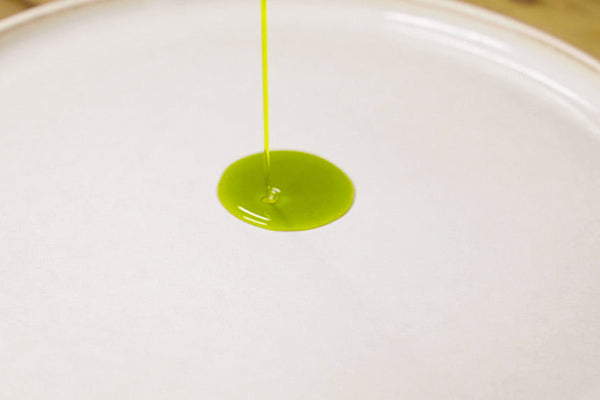
Difference between olive oil and sunflower oil: which to choose and why?
In Mediterranean cuisine, oil is not just an ingredient; it is an essential part of our culture, identity, and way of life. In Spain, olive oil is synonymous with tradition, health, and flavor, but in many kitchens it also coexists with another widely used oil: sunflower oil. Its use is quite widespread, especially for economic reasons and its neutral flavor, but the true differences between the two are not always known.
Is one healthier than the other? Which is more suitable for cooking? What benefits does each provide? In this article, we offer you a detailed, clear, and professional explanation of the key differences between olive oil and sunflower oil, so you can make informed decisions in your daily cooking.
Origin and production process
Olive oil is extracted from the fruit of the olive tree, the olive. In its most prized version, extra virgin olive oil, it is obtained through cold mechanical processes, without the use of chemicals. This guarantees a pure oil, full of flavor and with all its properties intact. Additionally, Spain is the world's largest producer of olive oil, which facilitates access to products of excellent quality and proximity.
Sunflower oil, by contrast, comes from sunflower seeds. Its extraction usually requires more complex industrial processes, including the use of solvents and chemical refining techniques to remove impurities and odors. Although cold-pressed sunflower oil also exists, it is not as common or as accessible in the general market.
Composition and nutritional profile
One of the main differences between these oils lies in the type of fat they provide. Extra virgin olive oil contains a high proportion of monounsaturated fats, especially oleic acid. These fats are very beneficial for cardiovascular health, as they help reduce LDL cholesterol (known as "bad cholesterol") and maintain adequate levels of HDL ("good cholesterol").
Sunflower oil, on the other hand, is rich in polyunsaturated fats, especially linoleic acid, a type of omega-6. Although this fatty acid is essential in the diet, an excess of omega-6 compared to omega-3 can promote inflammatory processes if not properly balanced with other sources of healthy fat.
Regarding micronutrients, both oils contain vitamin E, a powerful natural antioxidant. However, extra virgin olive oil offers an additional advantage: its high content of polyphenols. These antioxidant and anti-inflammatory compounds are absent or present in very low amounts in refined oils, such as conventional sunflower oil.
Thermal stability and culinary uses
When it comes to cooking, especially at high temperatures, oil stability is a key factor. Extra virgin olive oil has a relatively high smoke point and, thanks to its antioxidant profile, remains stable even during prolonged cooking. This means it withstands heat better and produces fewer toxic compounds when heated, making it a safe and healthy option for frying, sautéing, or baking.
Sunflower oil, for its part, has a somewhat lower smoke point and degrades more quickly when heated. This can generate potentially harmful substances if reused or subjected to high temperatures for a long time. In the food industry, a modified variety called "high oleic sunflower" is used, which improves its thermal behavior, but this type is not always available to the general consumer.
Regarding flavor, olive oil has a much richer and more characteristic profile, with notes that can range from fruity to spicy or bitter, depending on the olive variety. This makes it ideal for consuming raw, in dressings, on toast, or as a finishing touch on hot dishes. Sunflower oil, on the other hand, has a much more neutral taste, which can be an advantage in some baking recipes or dishes where you do not want to alter the food's flavor.
Health and disease prevention
Extra virgin olive oil has been widely studied for its health benefits. Various scientific studies have shown that its regular consumption within a balanced diet can reduce the risk of cardiovascular diseases, improve insulin sensitivity, and help prevent age-related cognitive decline. It is also attributed with anti-inflammatory and antioxidant properties that protect the body against cellular aging.
Sunflower oil, consumed in moderation, does not have serious harmful effects, but it does not offer the same proven benefits as olive oil. Its high concentration of omega-6 must be balanced with an adequate intake of omega-3, which does not always happen in today's Western diet. Additionally, the fact that it is refined significantly reduces its nutritional contribution compared to virgin oil.
Storage and durability
Another important aspect is oxidative stability, that is, how the oil behaves over time. Extra virgin olive oil, thanks to its natural antioxidants, is more resistant to oxidation and remains in good condition for longer, provided it is stored in a cool place, protected from light, and in an appropriate container.
Sunflower oil is more sensitive to light, oxygen, and heat, which accelerates its rancidity. This means it deteriorates more quickly and can lose quality even before its expiration date if not stored properly.
Price and accessibility
One of the reasons many people choose sunflower oil is its more affordable price. Indeed, it is usually cheaper than extra virgin olive oil, although this difference varies depending on the quality, origin, and type of olive oil compared (mild, intense, virgin, or extra virgin).
However, it is important to understand that extra virgin olive oil is not simply a more expensive product but an investment in health and flavor. Additionally, having a higher culinary yield, it lasts longer and withstands cooking better, which can offset its higher price in the long term.
Sustainability and proximity considerations
From an environmental and social perspective, olive oil also has clear advantages. Being a local product, with strong roots in the Spanish rural economy, its consumption helps keep olive grove landscapes alive, slows down the depopulation of agricultural areas, and protects a millenary agricultural culture.
Sunflower oil, although also partially cultivated in Spain, often depends on imports and more intensive industrial processes, which increase its ecological footprint. Choosing national extra virgin olive oil is not only a healthy choice but also a sustainable and responsible one.
Conclusion
Although both oils can have a place in the kitchen, the differences between extra virgin olive oil and sunflower oil are notable. The former stands out for its healthier nutritional profile, greater thermal stability, sensory richness, and beneficial health effects. The latter, more neutral and economical, can be useful in certain preparations but does not offer the same value in terms of quality or health.
If we seek a balanced, tasty, and environmentally respectful diet, extra virgin olive oil remains, without a doubt, the best choice. And in Spain, we are fortunate to have some of the best oils in the world within reach.
At Olivarte.es We invite you to discover, enjoy, and learn more about extra virgin olive oil. Because eating well is much more than just feeding yourself: it's about taking care of yourself, your loved ones, and the planet.





Leave a comment
This site is protected by hCaptcha and the hCaptcha Privacy Policy and Terms of Service apply.